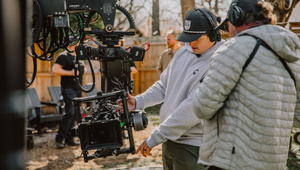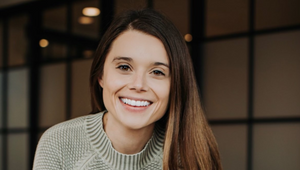
Producing Tomorrow's Producers: Why the Little Things Go a Long Way with Cody Fisher

As head of production for Gear Seven, Cody has been in the video production industry for over six years. He oversees the production crews on each Gear Seven project as well as establishing shoot day logistics and operational plans to ensure the smoothest and most efficient experiences for both the crew and the client.
LBB> What advice would you give to any aspiring producers or content creators hoping to make the jump into production?
Cody> I advise aspiring producers to get on as many sets as possible - especially across a bunch of different mediums (commercial, music, branded, etc.). The bulk of producing is learning how to avoid / prevent issues before they happen and you only learn how to avoid and prevent mistakes by encountering them.
LBB> What skills or emerging areas would you advise aspiring producers to learn about and educate themselves about?
Cody> There are a lot of different departments with their own unique lingo and needs, which can be overwhelming to a new producer. I would recommend getting at least a base-level education on what those needs are for each department and how to communicate those effectively. Producers (in my opinion) are often a 'jack of all trades and master of none.'
LBB> What was the biggest lesson you learned when you were starting out in production - and why has that stayed with you?
Code> Hope for the best and plan for the worst. I think this lesson is key two-fold. Bring hope and positivity to set but also trust nothing to go correctly. Always be ready to pivot, and come up with three fallback plans in pre-production.
Additionally, don’t assume anything. Assumptions create a false sense of security, and that can be dangerous for production. Overcommunication is just the right amount of communication when it comes to this field. There are times when even the smallest assumption (charging radios, double-checking talent call times, etc.) can lead to a huge issue down the line.
LBB> When it comes to broadening access to production and improving diversity and inclusion what are your team doing to address this?
Cody> Our team is always looking for recommendations for new crew + vendor introductions and I think that is critical. As a producer, one of your goals is to minimize risk and ensure productions have the fewest variables for issues. This is great and very important, but it can also lead to being stuck in your ways and never introducing new people to the mix. I’m proud that Gear Seven focuses on intentional and persistent efforts to bring on new & diverse crew.
LBB> And why is it an important issue for the production community to address?
Cody> In a creative field like video production, you want to have as many voices in the mix as possible. A lot of production is learned through experience; having folks with different life experience and background can provide valuable perspectives and insights to the process.
LBB> There are young people getting into production who maybe don’t see the line between professional production and the creator economy, and that may well also be the shape of things to come. What are your thoughts about that? Is there a tension between more formalised production and the ‘creator economy’ or do the two feed into each other?
Cody> I think when people are getting started they need to understand that even in the realm of 'professional productions,' no set is the same as another; it’s a spectrum. Every production will have its own set of challenges, benefits, learning experiences, etc.
I don’t believe a tension exists between the two. I would almost say that they are two different camps of creation. I think once the 'creator economy' reaches a scale of production it then morphs itself into an amalgamation of the two. Look at one of the largest creators on YouTube, Mr.Beast: the scale of what he is doing requires much more 'formalised production' than people probably think.
LBB> If you compare your role to the role of the heads of TV/heads of production/ Exec Producers when you first joined the industry, what do you think are the most striking or interesting changes (and what surprising things have stayed the same?)
Cody> Well the first that comes to mind is having to learn a great deal about transmissible diseases, testing protocols, etc. when covid first came onto the stage. I probably learned more in pre-production on shoots during covid than I did in all of my biology classes in college (joking, but maybe serious). It really just goes to show you that you always need to be on your feet, prepared and ready to adapt. If you have a solid base of communication skills and critical thinking experience, you are in a much better position to adapt when scenarios like this come out of left field.
LBB> It seems that there’s an emphasis on speed and volume when it comes to content - but to where is the space for up and coming producers to learn about (and learn to appreciate) craft?
Cody> There are definitely projects where the churn and burn speed of modern productions can lend itself to a lack of 'appreciation,' for the craft, but it is not a necessity. It is very important for you to internally find the value in a project and not leave that up to an external source to decide. When it comes to how the volume / speed of production affects 'learning the craft,' I think it provides much more opportunity for growth. The more you do, the more you learn.
LBB> On the other side of the equation, what’s the key to retaining expertise and helping people who have been working in production for decades to develop new skills? Clearly there is so much change, but what are the personality traits and skills that will always be in demand from producers?
Cody> The key to retaining people, no matter the industry, is making that individual feel valued and appreciated. That goes for outside the hours of a production too. Ask someone how their weekend was. If you know that a DP has a favourite coffee order, have it ready for them when they arrive. The little things go a long way.
There’s a million attributes that lend themselves to a stronger producer, but I think being forward-thinking is invaluable. Being able to see a situation and visualise potential issues lead to prevention and a much smoother shoot experience. Also, being calm under pressure is a great attribute. Stress and worry are very transmissible on set, like a disease. If you exude positivity and resolve even under the most chaotic of circumstances, people see that and mirror the sentiment.















